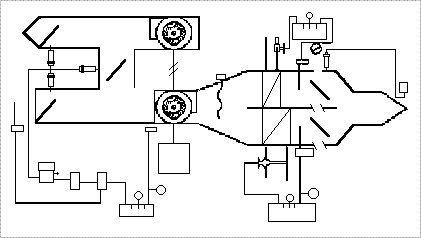 This seminar is designed for individuals who have taken the beginning "Pneumatic HVAC Controls Operations and Calibrations" course and/or have a good working knowledge of basic pneumatic control systems. Individuals who attend this seminar can expect to gain an excellent working knowledge of the more sophisticated systems and concepts in advanced pneumatic HVAC controls.
This seminar is designed for individuals who have taken the beginning "Pneumatic HVAC Controls Operations and Calibrations" course and/or have a good working knowledge of basic pneumatic control systems. Individuals who attend this seminar can expect to gain an excellent working knowledge of the more sophisticated systems and concepts in advanced pneumatic HVAC controls.
Monday
Review of basic pneumatic control devices and control sequences. General review of pneumatic basics, devices and system types (reheat, multizone, mixing box, variable air volume). General reinforcement of the first week material and concepts. Advanced control device calibration on positioners, receiver controllers, enthalpy controllers, static, differential and velocity controllers, logic networks, etc. The various devices will be available for hands-on understanding of their operation.
Tuesday
Attendees will be divided into groups of no more than 3 individuals per simulator station. Each simulator station has several receiver controllers, switching, reversing and pressure selector relays, P.E.s, E.P.s, thermostats, etc. for use. Each simulator station also has a complete receiver controller test kit that will be used to calibrate the various systems and receiver controllers. Advanced "systems" will be configured on the simulators for adjustment and calibration. Each student will receive a receiver controller calibration slide rule to assist in calibration and to keep. Troubleshooting methods and "tricks" will be covered. How to calculate proportional band, authority, ratio, etc.
Wednesday
More sophisticated control configurations. The simulators will be configured into these and other control sequences: }-Reset of the discharge of a reheat AHU. }-reset of hot water by outside air with pump cutoff. }-Chiller reset on outside air or offset. }-VAV static and velocity control sequences. }-Mixed air with economizer switchover. Typical psychometric problems and solutions will be analyzed during this phase of the seminar. Use of the psychometric chart is essential to understanding various processes the controls are accomplishing.
Thursday
Advanced control drawing reading and interpretation. The entire day will be spent improving the skills needed for reading and understanding control prints. Troubleshooting, calibration and repair of control systems becomes much easier with the ability to read and fully understand the control drawings. Simulated problems will be analyzed on the control prints for correct procedure to diagnose system problems. Drawings brought in by the students will be used if suitable.
Friday
The retrofitting-to-improve process. All control systems prior to about 1978 are effectively obsolete. They were designed with only initial cost and comfort in mind, and were, in many cases, horribly over designed. Energy was basically "free" compared to today. This phase of the seminar deals with analyzing present systems and establishing options to simplify, upgrade and improve their operational performance. Easily implemented pneumatic control simplification and operational improvements will be covered. Improvement options will include DDC modifications to pneumatic control systems.
NOTE: All participants will receive a complete textbook, a receiver controller calibration slide rule and a completion certificate.